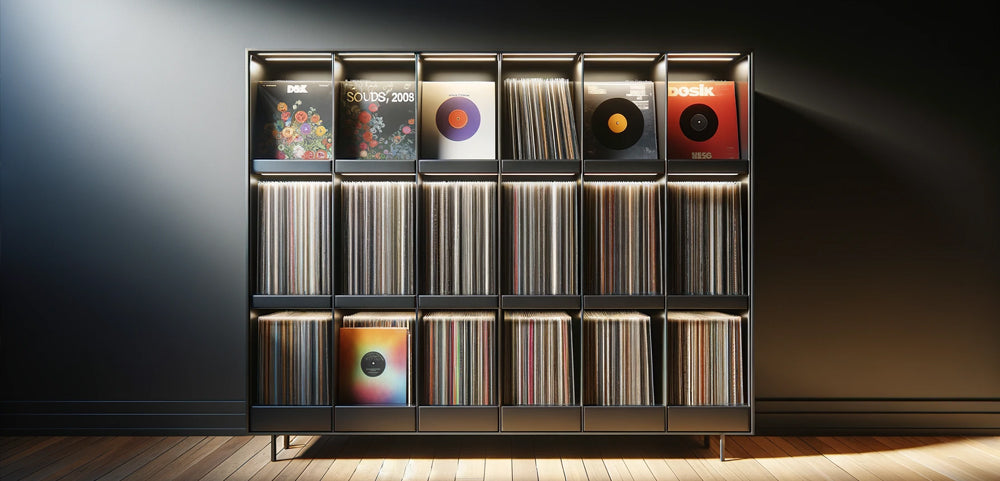
How to Properly Store Your Vinyl Collection
Storing your vinyl collection correctly is essential for preserving the quality and longevity of your records. Whether you're a seasoned collector or new to the world of vinyl, the following comprehensive guide will provide you with the best practices for storing your cherished collection.
Introduction to Vinyl Storage
Vinyl records are not just musical artifacts; they are delicate items that require proper care to maintain their sound quality and value. Improper storage can lead to a variety of issues, including warping, scratching, and mould growth, which can significantly degrade the listening experience and reduce the lifespan of your records.
Understanding the Basics
Before diving into storage solutions, it's important to grasp the basics of what can harm vinyl records. Exposure to extreme temperatures, humidity, direct sunlight, dust, and improper handling can all contribute to the deterioration of vinyl. Keeping these factors in mind will guide you in choosing the right storage solution for your collection.
Proper Handling
- Handling Records: Always hold records by the edges or the labelled surface to avoid fingerprints and scratches on the grooves.
- Cleaning: Use a soft, anti-static brush or cloth to gently remove dust from the surface before and after playing.
Environmental Considerations
- Temperature: Store your vinyl in a cool, stable environment, ideally at temperatures between 60-70°F (15-21°C).
- Humidity: Maintain relative humidity levels between 35-40% to prevent mould growth and warping.
- Light: Avoid exposing vinyl to direct sunlight or bright artificial lights, which can cause warping and fading.
Storage Solutions
- Shelving and Cabinets: Invest in sturdy, high-quality shelving that can support the weight of your collection. Ensure the shelves are wide and deep enough to store records vertically without sagging.
- Record Crates and Boxes: If shelving isn't an option, use specially designed record crates or boxes that provide adequate support and protection. Ensure they are made from materials that won't off-gas harmful chemicals.
- Inner and Outer Sleeves: Use high-quality, anti-static inner sleeves to protect the vinyl surface and sturdy outer sleeves to guard against dust, dirt, and shelf wear.
Organising Your Collection
- Categorisation: Organise your collection in a way that makes sense to you, whether it's alphabetically, by genre, or release date. This not only makes finding records easier but also prevents unnecessary handling and potential damage.
- Vertical Storage: Always store vinyl records vertically to prevent warping and unnecessary pressure on the records at the bottom. Avoid stacking them horizontally.
- Spacing: Ensure there's enough room on the shelves so records aren't squeezed together too tightly, which can lead to warping and ring wear on the album covers.
Special Considerations
- Rare and Valuable Records: Consider storing extremely rare or valuable records in climate-controlled environments and using additional protective measures, such as UV-protective outer sleeves.
- Mobile Collections: If you frequently transport records, invest in high-quality, protective carrying cases designed for vinyl.
FAQs
-
How should I clean my vinyl records before storing them?
- Clean your records with a soft, anti-static brush to remove surface dust. For deeper cleaning, use a vinyl record cleaning solution and a microfiber cloth, ensuring you follow the recommended method to avoid damaging the grooves.
-
Is it okay to store vinyl records in the basement or attic?
- It's generally not recommended to store vinyl records in basements or attics due to potential extreme temperatures, humidity, and risk of flooding or leaks. It's best to store them in a climate-controlled area within your living space.
-
Can I use plastic sleeves for my vinyl records?
- Yes, plastic outer sleeves can protect your records from dust and shelf wear. However, ensure they are made from polyethylene or polypropylene rather than PVC, which can chemically react with the vinyl over time.
-
How tight should records be packed on a shelf?
- Records should be stored upright and snugly enough to stay vertical, but not so tight that they warp or are hard to remove. Leave a bit of space to easily slide a record out without pressure on adjacent albums.
-
What do I do if my record warps?
- Slight warping can sometimes be fixed by using a vinyl flattening device or method, but results vary and there's a risk of damaging the record further. For valuable records, consult a professional. Preventative care is the best solution to avoid warping.
Let's Conclude
Proper storage is key to maintaining the integrity and value of your vinyl collection. By following these guidelines, you can ensure that your records remain in excellent condition, providing you with high-quality sound and enjoyment for years to come. Remember, your vinyl collection is not just a set of records; it's a compilation of musical art that deserves the utmost care and respect.


